CF916E Jamie and Tree 题解
题目链接:CF 或者 洛谷
本题难点在于换根 LCA 与换根以后的子树范围寻找,重点讲解
先说操作一,假如原根为
第二个和第三个操作都可以总结为两步,找以当前为根的
先说第一个如何找
-
都是
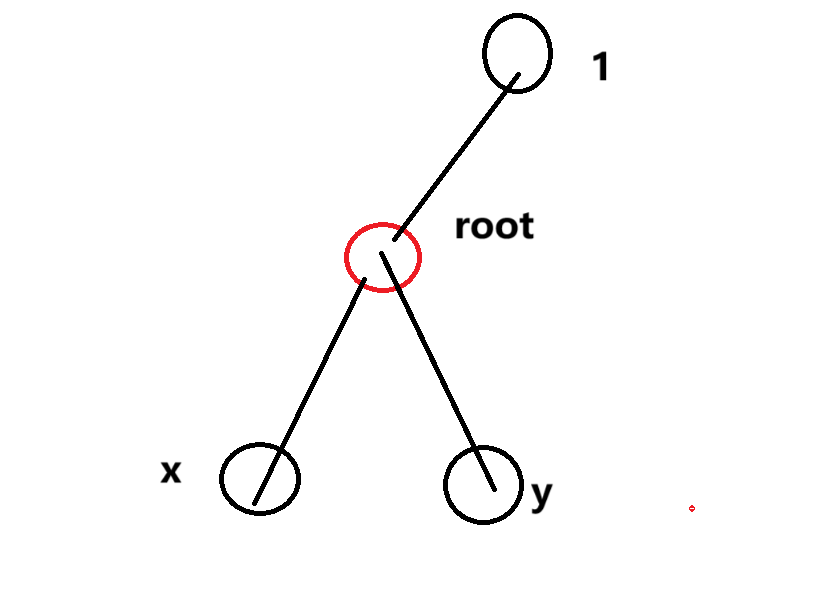
-
一个是子树上的,一个非子树上的。如图所示还是
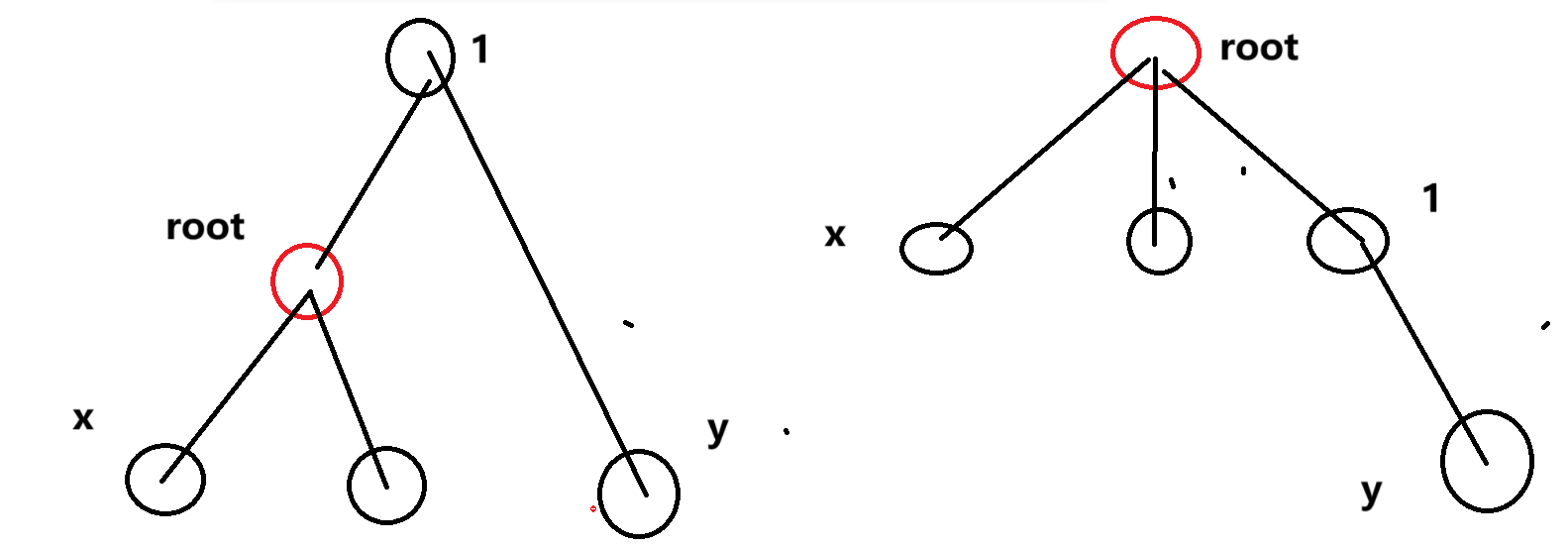
- 都不在子树里。
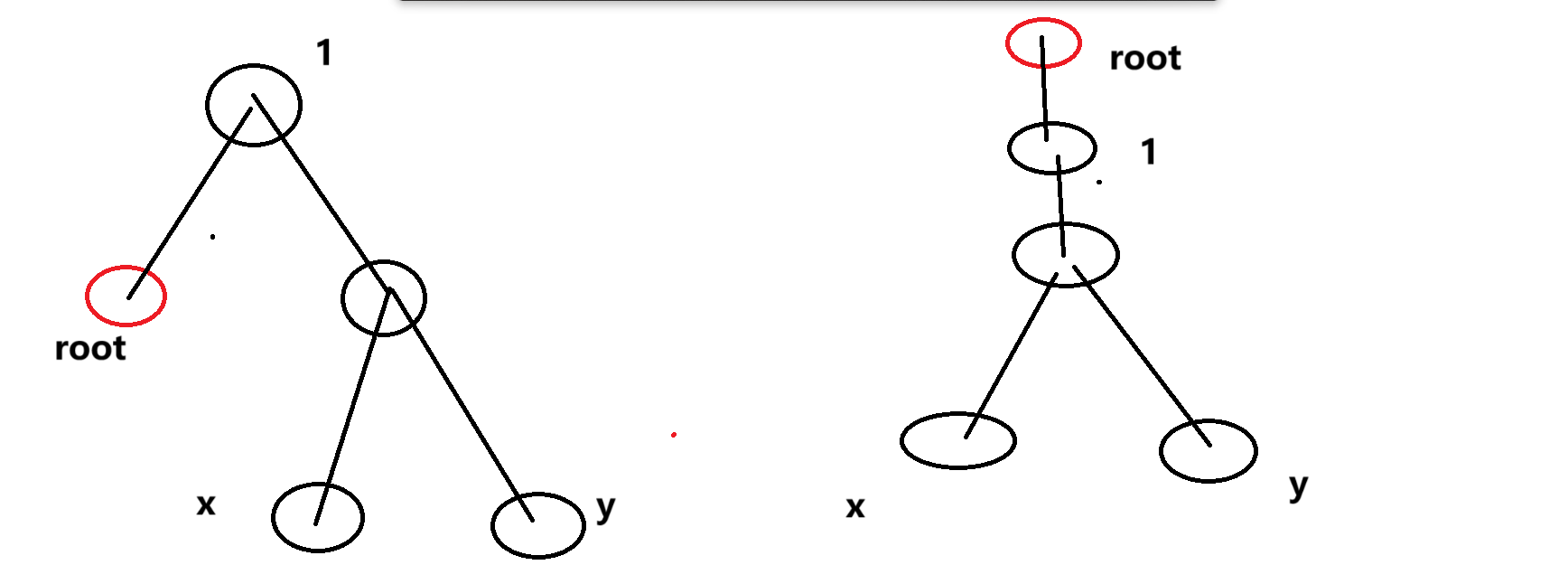
这个我们这样考虑,
这三个情况可以统一成,我们再求出
接下来解决如何找到当前
前两种情况显然
考虑第三种情况,分讨下,
- 不在子

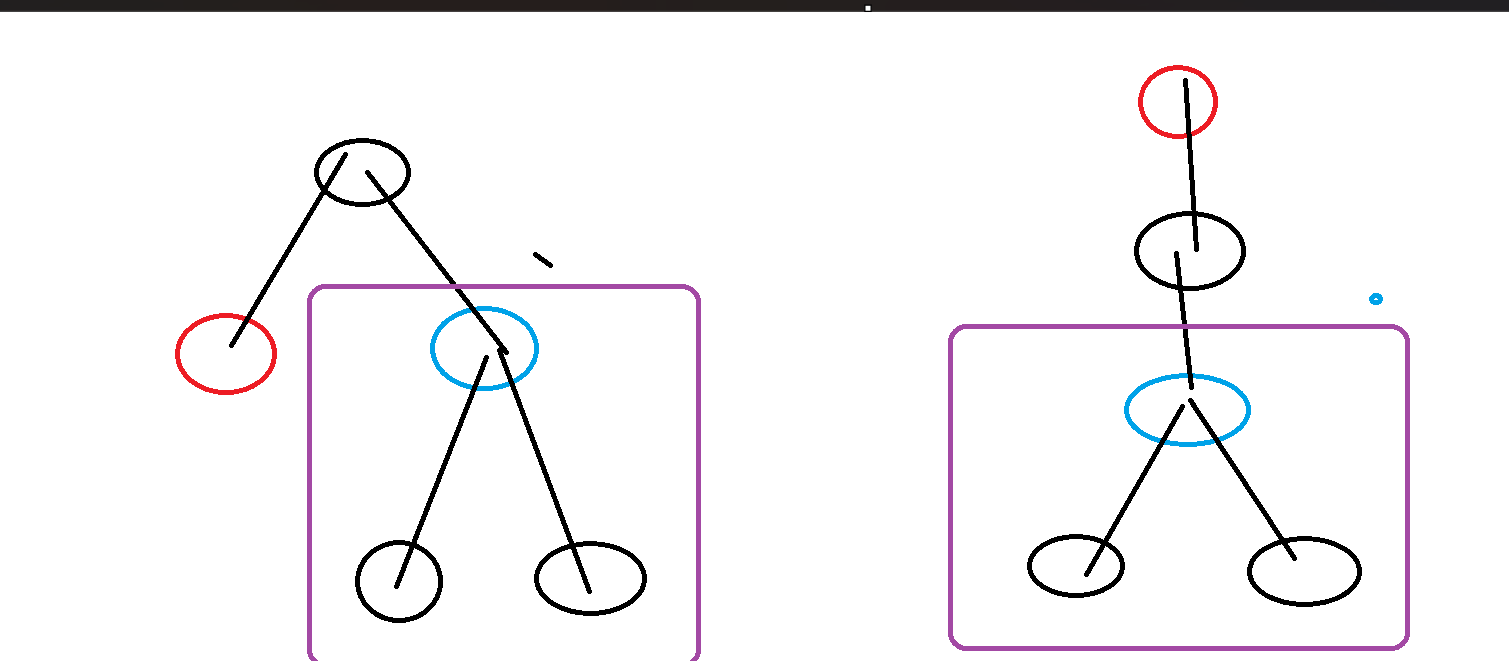
子树形态是并未发生变化的。
- 在
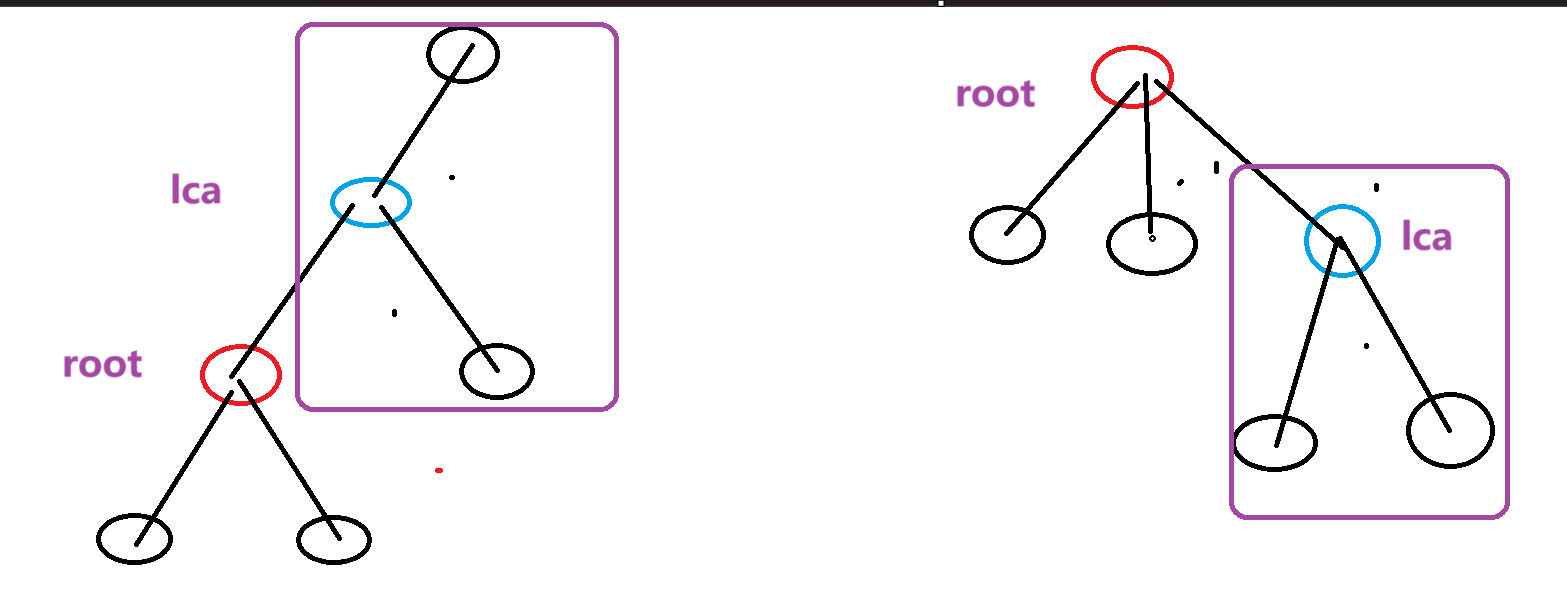
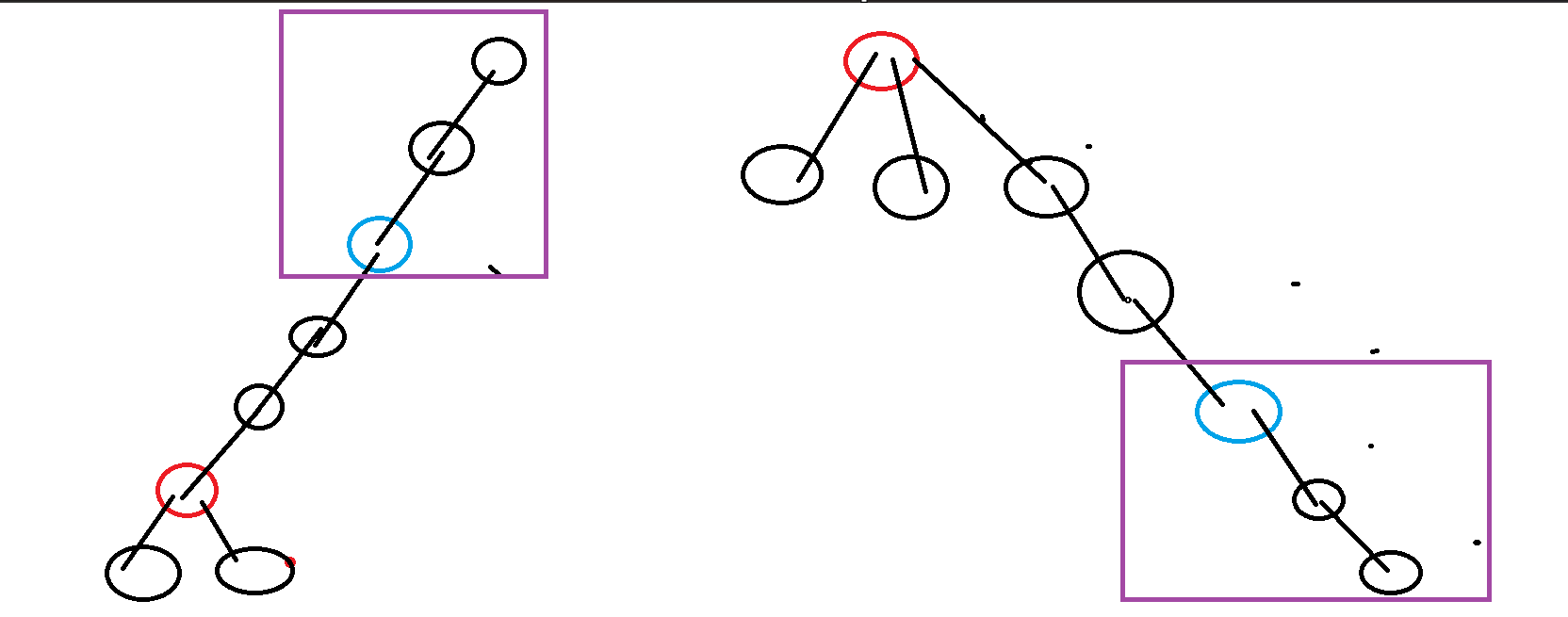
不得不说,太类似换根 dp 的套路,这玩意我们容斥来做,整棵树去掉
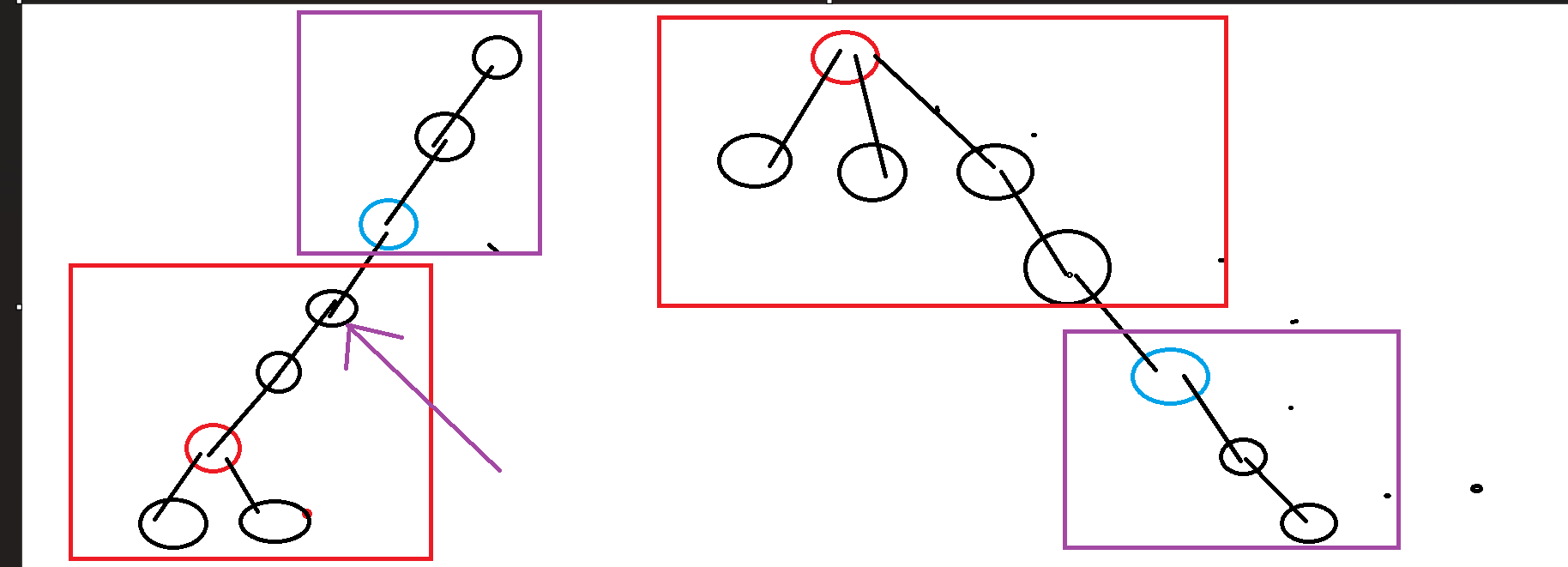
如图所示,全局加然后去掉红色部分贡献,即为正确的了,至于怎么找
解法一
涉及到了子树加,子树求和,我们使用
参照代码
#include <bits/stdc++.h> // #pragma GCC optimize(2) // #pragma GCC optimize("Ofast,no-stack-protector,unroll-loops,fast-math") // #pragma GCC target("sse,sse2,sse3,ssse3,sse4.1,sse4.2,avx,avx2,popcnt,tune=native") // #define isPbdsFile #ifdef isPbdsFile #include <bits/extc++.h> #else #include <ext/pb_ds/priority_queue.hpp> #include <ext/pb_ds/hash_policy.hpp> #include <ext/pb_ds/tree_policy.hpp> #include <ext/pb_ds/trie_policy.hpp> #include <ext/pb_ds/tag_and_trait.hpp> #include <ext/pb_ds/hash_policy.hpp> #include <ext/pb_ds/list_update_policy.hpp> #include <ext/pb_ds/assoc_container.hpp> #include <ext/pb_ds/exception.hpp> #include <ext/rope> #endif using namespace std; using namespace __gnu_cxx; using namespace __gnu_pbds; typedef long long ll; typedef long double ld; typedef pair<int, int> pii; typedef pair<ll, ll> pll; typedef tuple<int, int, int> tii; typedef tuple<ll, ll, ll> tll; typedef unsigned int ui; typedef unsigned long long ull; typedef __int128 i128; #define hash1 unordered_map #define hash2 gp_hash_table #define hash3 cc_hash_table #define stdHeap std::priority_queue #define pbdsHeap __gnu_pbds::priority_queue #define sortArr(a, n) sort(a+1,a+n+1) #define all(v) v.begin(),v.end() #define yes cout<<"YES" #define no cout<<"NO" #define Spider ios_base::sync_with_stdio(false);cin.tie(nullptr);cout.tie(nullptr); #define MyFile freopen("..\\input.txt", "r", stdin),freopen("..\\output.txt", "w", stdout); #define forn(i, a, b) for(int i = a; i <= b; i++) #define forv(i, a, b) for(int i=a;i>=b;i--) #define ls(x) (x<<1) #define rs(x) (x<<1|1) #define endl '\n' //用于Miller-Rabin [[maybe_unused]] static int Prime_Number[13] = {0, 2, 3, 5, 7, 11, 13, 17, 19, 23, 29, 31, 37}; template <typename T> int disc(T* a, int n) { return unique(a + 1, a + n + 1) - (a + 1); } template <typename T> T lowBit(T x) { return x & -x; } template <typename T> T Rand(T l, T r) { static mt19937 Rand(time(nullptr)); uniform_int_distribution<T> dis(l, r); return dis(Rand); } template <typename T1, typename T2> T1 modt(T1 a, T2 b) { return (a % b + b) % b; } template <typename T1, typename T2, typename T3> T1 qPow(T1 a, T2 b, T3 c) { a %= c; T1 ans = 1; for (; b; b >>= 1, (a *= a) %= c)if (b & 1)(ans *= a) %= c; return modt(ans, c); } template <typename T> void read(T& x) { x = 0; T sign = 1; char ch = getchar(); while (!isdigit(ch)) { if (ch == '-')sign = -1; ch = getchar(); } while (isdigit(ch)) { x = (x << 3) + (x << 1) + (ch ^ 48); ch = getchar(); } x *= sign; } template <typename T, typename... U> void read(T& x, U&... y) { read(x); read(y...); } template <typename T> void write(T x) { if (typeid(x) == typeid(char))return; if (x < 0)x = -x, putchar('-'); if (x > 9)write(x / 10); putchar(x % 10 ^ 48); } template <typename C, typename T, typename... U> void write(C c, T x, U... y) { write(x), putchar(c); write(c, y...); } template <typename T11, typename T22, typename T33> struct T3 { T11 one; T22 tow; T33 three; bool operator<(const T3 other) const { if (one == other.one) { if (tow == other.tow)return three < other.three; return tow < other.tow; } return one < other.one; } T3() { one = tow = three = 0; } T3(T11 one, T22 tow, T33 three) : one(one), tow(tow), three(three) { } }; template <typename T1, typename T2> void uMax(T1& x, T2 y) { if (x < y)x = y; } template <typename T1, typename T2> void uMin(T1& x, T2 y) { if (x > y)x = y; } constexpr int N = 1e5 + 10; constexpr int T = 20; int s[N], e[N], dfn[N], cnt; int deep[N], fa[N][T + 1]; int a[N], root = 1; vector<int> child[N]; int n, q; struct { struct Node { ll sum, add, len; } node[N << 2]; #define len(x) node[x].len #define add(x) node[x].add #define sum(x) node[x].sum void Add(const int curr, const ll val) { add(curr) += val; sum(curr) += len(curr) * val; } void pushDown(const int curr) { if (add(curr)) { Add(ls(curr),add(curr)), Add(rs(curr),add(curr)); add(curr) = 0; } } void pushUp(const int curr) { sum(curr) = sum(ls(curr)) + sum(rs(curr)); } void build(const int curr, const int l = 1, const int r = n) { len(curr) = r - l + 1; const int mid = l + r >> 1; if (l == r) { sum(curr) = a[dfn[l]]; return; } build(ls(curr), l, mid); build(rs(curr), mid + 1, r); pushUp(curr); } void Add(const int curr, const int l, const int r, const int val, const int s = 1, const int e = n) { if (l <= s and e <= r) { Add(curr, val); return; } const int mid = s + e >> 1; pushDown(curr); if (l <= mid)Add(ls(curr), l, r, val, s, mid); if (r > mid)Add(rs(curr), l, r, val, mid + 1, e); pushUp(curr); } ll Query(const int curr, const int l, const int r, const int s = 1, const int e = n) { if (l <= s and e <= r)return sum(curr); pushDown(curr); const int mid = s + e >> 1; ll ans = 0; if (l <= mid)ans += Query(ls(curr), l, r, s, mid); if (r > mid)ans += Query(rs(curr), l, r, mid + 1, e); return ans; } } seg; inline void dfs(const int curr, const int parent) { deep[curr] = deep[fa[curr][0] = parent] + 1; forn(i, 1, T)fa[curr][i] = fa[fa[curr][i - 1]][i - 1]; dfn[++cnt] = curr; s[curr] = cnt; for (const auto nxt : child[curr])if (nxt != parent)dfs(nxt, curr); e[curr] = cnt; } inline int lca(int x, int y) { if (deep[x] < deep[y])swap(x, y); forv(i, T, 0)if (deep[fa[x][i]] >= deep[y])x = fa[x][i]; if (x == y)return x; forv(i, T, 0)if (fa[x][i] != fa[y][i])x = fa[x][i], y = fa[y][i]; return fa[x][0]; } inline int LCA(const int x, const int y) { const int t1 = lca(root, x), t2 = lca(root, y), t3 = lca(x, y); const int maxDeep = max({deep[t1], deep[t2], deep[t3]}); if (maxDeep == deep[t1])return t1; if (maxDeep == deep[t2])return t2; return t3; } inline int top(int x, int k) { while (k) { const int step = log2(k); x = fa[x][step]; k -= 1 << step; } return x; } inline void Add(const int curr, const int val) { if (curr == root)seg.Add(1, 1, n, val); else if (s[curr] <= s[root] and e[root] <= e[curr]) { const int del = top(root, deep[root] - deep[curr] - 1); seg.Add(1, 1, n, val), seg.Add(1, s[del], e[del], -val); } else seg.Add(1, s[curr], e[curr], val); } inline ll Query(const int curr) { if (curr == root)return seg.Query(1, 1, n); if (s[curr] <= s[root] and e[root] <= e[curr]) { const int del = top(root, deep[root] - deep[curr] - 1); return seg.Query(1, 1, n) - seg.Query(1, s[del], e[del]); } return seg.Query(1, s[curr], e[curr]); } inline void solve() { cin >> n >> q; forn(i, 1, n)cin >> a[i]; forn(i, 1, n-1) { int u, v; cin >> u >> v; child[u].push_back(v), child[v].push_back(u); } dfs(1, 0); seg.build(1); while (q--) { int op; cin >> op; if (op == 1)cin >> root; else if (op == 2) { int u, v, val; cin >> u >> v >> val; Add(LCA(u, v), val); } else { int curr; cin >> curr; cout << Query(curr) << endl; } } } signed int main() { // MyFile Spider //------------------------------------------------------ // clock_t start = clock(); int test = 1; // read(test); // cin >> test; forn(i, 1, test)solve(); // while (cin >> n, n)solve(); // while (cin >> test)solve(); // clock_t end = clock(); // cerr << "time = " << double(end - start) / CLOCKS_PER_SEC << "s" << endl; }
如果用Python 写的话,最好用一些常数小的东西,比如差分BIT 或者 zkw 线段树。
Python参照代码
import sys from types import GeneratorType input = lambda: sys.stdin.readline().strip() print = lambda d: sys.stdout.write(str(d) + "\n") M = lambda: map(int, input().split()) read = lambda: list(M()) N = 10 ** 5 + 10 T = 17 fa = [[0] * (T + 1) for _ in range(N)] child = [[] for _ in range(N)] deep = [0] * N s, e, dfn = deep.copy(), deep.copy(), deep.copy() cnt = 0 bit1, bit2 = deep.copy(), deep.copy() lowBit = [0] * N LOG2 = [0] * N def bootstrap(f, stack=[]): def wrappedfunc(*args, **kwargs): if stack: return f(*args, **kwargs) else: to = f(*args, **kwargs) while True: if type(to) is GeneratorType: stack.append(to) to = next(to) else: stack.pop() if not stack: break to = stack[-1].send(to) return to return wrappedfunc def add(i: int, v: int): x = i while i <= n: bit1[i] += v bit2[i] += (x - 1) * v i += lowBit[i] def query(i: int): ans = 0 x = i while i: ans += x * bit1[i] - bit2[i] i -= lowBit[i] return ans def Update(l: int, r: int, x: int): add(l, x) add(r + 1, -x) def Query(l: int, r: int): return query(r) - query(l - 1) n, q = M() val = [0] + read() for i in range(1, n + 1): lowBit[i] = i & -i for i in range(2, n + 1): LOG2[i] = LOG2[i >> 1] + 1 for _ in range(n - 1): u, v = M() child[u].append(v) child[v].append(u) @bootstrap def dfs(curr: int, parent: int): fa[curr][0] = parent deep[curr] = deep[parent] + 1 global cnt cnt += 1 dfn[cnt] = curr s[curr] = cnt for i in range(1, T + 1): fa[curr][i] = fa[fa[curr][i - 1]][i - 1] for nxt in child[curr]: if nxt != parent: yield dfs(nxt, curr) e[curr] = cnt yield def lca(x: int, y: int): if deep[x] < deep[y]: x, y = y, x for i in range(T, -1, -1): if deep[fa[x][i]] >= deep[y]: x = fa[x][i] if x == y: return x for i in range(T, -1, -1): if fa[x][i] != fa[y][i]: x = fa[x][i] y = fa[y][i] return fa[x][0] root = 1 def LCA(x, y): t1, t2, t3 = lca(root, x), lca(root, y), lca(x, y) mxDeep = max(deep[t1], deep[t2], deep[t3]) if mxDeep == deep[t1]: return t1 if mxDeep == deep[t2]: return t2 return t3 def top(x: int, k: int): while k: step = LOG2[k] x = fa[x][step] k -= 1 << step return x def Add(curr: int, v: int): if curr == root: Update(1, n, v) elif s[curr] <= s[root] and e[root] <= e[curr]: t = top(root, deep[root] - deep[curr] - 1) Update(1, n, v) Update(s[t], e[t], -v) else: Update(s[curr], e[curr], v) def Ans(curr: int): if curr == root: return Query(1, n) elif s[curr] <= s[root] and e[root] <= e[curr]: t = top(root, deep[root] - deep[curr] - 1) return Query(1, n) - Query(s[t], e[t]) return Query(s[curr], e[curr]) dfs(1, 0) for i in range(1, n + 1): t = val[dfn[i]] - val[dfn[i - 1]] bit1[i] += t bit2[i] += (i - 1) * t j = i + lowBit[i] if j <= n: bit1[j] += bit1[i] bit2[j] += bit2[i] for _ in range(q): op = read() if op[0] == 1: root = op[1] elif op[0] == 2: u, v, val = op[1:] Add(LCA(u, v), val) else: print(Ans(op[1]))
解法二
参照朋友的 博客 的换根树剖。其实主要是讲讲
-
如果
-
不在同一条链让
-
基于第二天,答案要么为
参照代码
#include <bits/stdc++.h> // #pragma GCC optimize(2) // #pragma GCC optimize("Ofast,no-stack-protector,unroll-loops,fast-math") // #pragma GCC target("sse,sse2,sse3,ssse3,sse4.1,sse4.2,avx,avx2,popcnt,tune=native") // #define isPbdsFile #ifdef isPbdsFile #include <bits/extc++.h> #else #include <ext/pb_ds/priority_queue.hpp> #include <ext/pb_ds/hash_policy.hpp> #include <ext/pb_ds/tree_policy.hpp> #include <ext/pb_ds/trie_policy.hpp> #include <ext/pb_ds/tag_and_trait.hpp> #include <ext/pb_ds/hash_policy.hpp> #include <ext/pb_ds/list_update_policy.hpp> #include <ext/pb_ds/assoc_container.hpp> #include <ext/pb_ds/exception.hpp> #include <ext/rope> #endif using namespace std; using namespace __gnu_cxx; using namespace __gnu_pbds; typedef long long ll; typedef long double ld; typedef pair<int, int> pii; typedef pair<ll, ll> pll; typedef tuple<int, int, int> tii; typedef tuple<ll, ll, ll> tll; typedef unsigned int ui; typedef unsigned long long ull; typedef __int128 i128; #define hash1 unordered_map #define hash2 gp_hash_table #define hash3 cc_hash_table #define stdHeap std::priority_queue #define pbdsHeap __gnu_pbds::priority_queue #define sortArr(a, n) sort(a+1,a+n+1) #define all(v) v.begin(),v.end() #define yes cout<<"YES" #define no cout<<"NO" #define Spider ios_base::sync_with_stdio(false);cin.tie(nullptr);cout.tie(nullptr); #define MyFile freopen("..\\input.txt", "r", stdin),freopen("..\\output.txt", "w", stdout); #define forn(i, a, b) for(int i = a; i <= b; i++) #define forv(i, a, b) for(int i=a;i>=b;i--) #define ls(x) (x<<1) #define rs(x) (x<<1|1) #define endl '\n' //用于Miller-Rabin [[maybe_unused]] static int Prime_Number[13] = {0, 2, 3, 5, 7, 11, 13, 17, 19, 23, 29, 31, 37}; template <typename T> int disc(T* a, int n) { return unique(a + 1, a + n + 1) - (a + 1); } template <typename T> T lowBit(T x) { return x & -x; } template <typename T> T Rand(T l, T r) { static mt19937 Rand(time(nullptr)); uniform_int_distribution<T> dis(l, r); return dis(Rand); } template <typename T1, typename T2> T1 modt(T1 a, T2 b) { return (a % b + b) % b; } template <typename T1, typename T2, typename T3> T1 qPow(T1 a, T2 b, T3 c) { a %= c; T1 ans = 1; for (; b; b >>= 1, (a *= a) %= c)if (b & 1)(ans *= a) %= c; return modt(ans, c); } template <typename T> void read(T& x) { x = 0; T sign = 1; char ch = getchar(); while (!isdigit(ch)) { if (ch == '-')sign = -1; ch = getchar(); } while (isdigit(ch)) { x = (x << 3) + (x << 1) + (ch ^ 48); ch = getchar(); } x *= sign; } template <typename T, typename... U> void read(T& x, U&... y) { read(x); read(y...); } template <typename T> void write(T x) { if (typeid(x) == typeid(char))return; if (x < 0)x = -x, putchar('-'); if (x > 9)write(x / 10); putchar(x % 10 ^ 48); } template <typename C, typename T, typename... U> void write(C c, T x, U... y) { write(x), putchar(c); write(c, y...); } template <typename T11, typename T22, typename T33> struct T3 { T11 one; T22 tow; T33 three; bool operator<(const T3 other) const { if (one == other.one) { if (tow == other.tow)return three < other.three; return tow < other.tow; } return one < other.one; } T3() { one = tow = three = 0; } T3(T11 one, T22 tow, T33 three) : one(one), tow(tow), three(three) { } }; template <typename T1, typename T2> void uMax(T1& x, T2 y) { if (x < y)x = y; } template <typename T1, typename T2> void uMin(T1& x, T2 y) { if (x > y)x = y; } constexpr int N = 1e5 + 10; constexpr int T = 20; int deep[N], son[N], siz[N], fa[N]; vector<int> child[N]; int n, q; inline void dfs1(const int curr, const int parent) { deep[curr] = deep[fa[curr] = parent] + 1; siz[curr] = 1; for (const auto nxt : child[curr]) { if (nxt == parent)continue; dfs1(nxt, curr); siz[curr] += siz[nxt]; if (siz[nxt] > siz[son[curr]])son[curr] = nxt; } } int idx[N], s[N], e[N], top[N], cnt; inline void dfs2(const int curr, const int root) { idx[++cnt] = curr, s[curr] = cnt, e[curr] = s[curr] + siz[curr] - 1; top[curr] = root; if (son[curr])dfs2(son[curr], root); for (const auto nxt : child[curr])if (nxt != fa[curr] and nxt != son[curr])dfs2(nxt, nxt); } int a[N], root = 1; struct { struct Node { ll sum, add, len; } node[N << 2]; #define len(x) node[x].len #define add(x) node[x].add #define sum(x) node[x].sum void Add(const int curr, const ll val) { add(curr) += val; sum(curr) += len(curr) * val; } void pushDown(const int curr) { if (add(curr)) { Add(ls(curr),add(curr)), Add(rs(curr),add(curr)); add(curr) = 0; } } void pushUp(const int curr) { sum(curr) = sum(ls(curr)) + sum(rs(curr)); } void build(const int curr, const int l = 1, const int r = n) { len(curr) = r - l + 1; const int mid = l + r >> 1; if (l == r) { sum(curr) = a[idx[l]]; return; } build(ls(curr), l, mid); build(rs(curr), mid + 1, r); pushUp(curr); } void Add(const int curr, const int l, const int r, const int val, const int s = 1, const int e = n) { if (l <= s and e <= r) { Add(curr, val); return; } const int mid = s + e >> 1; pushDown(curr); if (l <= mid)Add(ls(curr), l, r, val, s, mid); if (r > mid)Add(rs(curr), l, r, val, mid + 1, e); pushUp(curr); } ll Query(const int curr, const int l, const int r, const int s = 1, const int e = n) { if (l <= s and e <= r)return sum(curr); pushDown(curr); const int mid = s + e >> 1; ll ans = 0; if (l <= mid)ans += Query(ls(curr), l, r, s, mid); if (r > mid)ans += Query(rs(curr), l, r, mid + 1, e); return ans; } } seg; inline int lca(int x, int y) { while (top[x] != top[y]) { if (deep[top[x]] < deep[top[y]])swap(x, y); x = fa[top[x]]; } if (deep[x] > deep[y])swap(x, y); return x; } inline int LCA(const int x, const int y) { const int t1 = lca(root, x), t2 = lca(root, y), t3 = lca(x, y); const int maxDeep = max({deep[t1], deep[t2], deep[t3]}); if (maxDeep == deep[t1])return t1; if (maxDeep == deep[t2])return t2; return t3; } //从root到curr的路径上最后一个点 inline int TreeTop(const int curr, int x = root) { if (top[curr] == top[x])return son[curr]; while (top[fa[top[x]]] != top[curr])x = fa[top[x]]; x = top[x]; if (fa[x] != curr)x = son[curr]; return x; } inline bool sameTree(const int curr) { return s[curr] <= s[root] and e[root] <= e[curr]; } inline void Add(const int curr, const int val) { if (curr == root)seg.Add(1, 1, n, val); else if (sameTree(curr)) { const int del = TreeTop(curr); seg.Add(1, 1, n, val), seg.Add(1, s[del], e[del], -val); } else seg.Add(1, s[curr], e[curr], val); } inline ll Query(const int curr) { if (curr == root)return seg.Query(1, 1, n); if (sameTree(curr)) { const int del = TreeTop(curr); return seg.Query(1, 1, n) - seg.Query(1, s[del], e[del]); } return seg.Query(1, s[curr], e[curr]); } inline void solve() { cin >> n >> q; forn(i, 1, n)cin >> a[i]; forn(i, 1, n-1) { int u, v; cin >> u >> v; child[u].push_back(v), child[v].push_back(u); } dfs1(1, 0); dfs2(1, 1); seg.build(1); while (q--) { int op; cin >> op; if (op == 1)cin >> root; else if (op == 2) { int u, v, val; cin >> u >> v >> val; Add(LCA(u, v), val); } else { int curr; cin >> curr; cout << Query(curr) << endl; } } } signed int main() { // MyFile Spider //------------------------------------------------------ // clock_t start = clock(); int test = 1; // read(test); // cin >> test; forn(i, 1, test)solve(); // while (cin >> n, n)solve(); // while (cin >> test)solve(); // clock_t end = clock(); // cerr << "time = " << double(end - start) / CLOCKS_PER_SEC << "s" << endl; }
Rust参照代码
#![allow(unused_variables)] #![allow(clippy::large_stack_arrays)] #![allow(unused_macros)] #![allow(unused_mut)] #![allow(dead_code)] #![allow(unused_imports)] #![allow(non_upper_case_globals)] use std::io::{BufRead, Write}; use std::mem::swap; use std::ops::{Add, AddAssign}; //----------------------------递归闭包--------------------------- struct Func<'a, A, F>(&'a dyn Fn(Func<'a, A, F>, A) -> F); impl<'a, A, F> Clone for Func<'a, A, F> { fn clone(&self) -> Self { Self(self.0) } } impl<'a, A, F> Copy for Func<'a, A, F> {} impl<'a, A, F> Func<'a, A, F> { fn call(&self, f: Func<'a, A, F>, x: A) -> F { (self.0)(f, x) } } fn y<A, R>(g: impl Fn(&dyn Fn(A) -> R, A) -> R) -> impl Fn(A) -> R { move |x| (|f: Func<A, R>, x| f.call(f, x))(Func(&|f, x| g(&|x| f.call(f, x), x)), x) } //Y组合子使用示例:(多参采用元组传参) // let dfs = | f: & dyn Fn((usize, i32,bool)) -> bool, (i,sum,s): (usize,i32,bool) | -> bool{ // if i == n { // return sum == 0 & & s; // } // return f((i + 1, sum + a[i], true)) | | f((i + 1, sum, s)) | | // f((i + 1, sum - a[i], true)); // }; //----------------------------递归闭包--------------------------- //----------------------------常用函数---------------------------- #[inline] fn prefix_array<T>(a: &Vec<T>, start: T) -> Vec<T> where T: Add<Output = T> + Copy + AddAssign, { (0..=a.len()) .scan(start, |x, y| { if y == 0 { Some(start) } else { *x += a[y - 1]; Some(*x) } }) .collect::<Vec<T>>() } #[inline] fn suffix_array<T>(a: &Vec<T>, end: T) -> Vec<T> where T: Add<Output = T> + Copy + AddAssign, { let mut tmp = (0..=a.len()) .rev() .scan(end, |x, y| { if y == a.len() { Some(end) } else { *x += a[y]; Some(*x) } }) .collect::<Vec<T>>(); tmp.reverse(); tmp } //----------------------------常用函数---------------------------- macro_rules! __inner_io_prelude { ($scanner:ident, $out:ident, $dol:tt) => { use crate::io::in_out; use crate::io::Scanner; use std::io::Write; let ($scanner, mut $out) = in_out(); let mut $scanner = Scanner::new($scanner); macro_rules! __inner_input {(mut $a:ident : $type:tt) => {let mut $a: $type = $scanner.next();};($a:ident : $type:tt) => {let $a: $type = $scanner.next();};} macro_rules! input {($dol ($dol($idents: ident)+ : $type: tt),*) => {$dol (__inner_input!{$dol ($idents)+: $type})*};} macro_rules! put {($dol ($dol format:tt)*) => { let _ = write!($out, $dol ($dol format)*);};} macro_rules! puts {($dol ($dol format:tt)*) => { let _ = writeln!($out, $dol ($dol format)*);};} macro_rules! read_string_u8 {() => {$scanner.next::<String>().into_bytes()};} macro_rules! print_all {($A:expr) => {{for &v in &$A {let _ = write!($out, "{} ", v);}puts!();}};} macro_rules! read_usize {($n:expr) => {(0..$n).map(|_|$scanner.next::<usize>()).collect::<Vec<usize>>()};} macro_rules! read_i32 {($n:expr) => {(0..$n).map(|_|$scanner.next::<i32>()).collect::<Vec<i32>>()};} macro_rules! read_i64 {($n:expr) => {(0..$n).map(|_|$scanner.next::<i64>()).collect::<Vec<i64>>()};} macro_rules! read_i128 {($n:expr) => {(0..$n).map(|_|$scanner.next::<i128>()).collect::<Vec<i128>>()};} macro_rules! read_tow_array_usize {($n:expr,$m:expr) => {(0..$n).map(|_| read_usize!($m)).collect::<Vec<Vec<usize>>>()};} macro_rules! read_tow_array_i32 {($n:expr,$m:expr) => {(0..$n).map(|_| read_i32!($m)).collect::<Vec<Vec<i32>>>()};} macro_rules! read_tow_array_i64 {($n:expr,$m:expr) => {(0..$n).map(|_| read_i64!($m)).collect::<Vec<Vec<i64>>>()};} macro_rules! read_tow_array_i128 {($n:expr,$m:expr) => {(0..$n).map(|_| read_i128!($m)).collect::<Vec<Vec<i128>>>()};} macro_rules! count_bit {($n:expr) => {{let (mut ans, mut k) = (0_usize, $n);while k > 0 {ans += 1;k &= k - 1;}ans}};} }; } macro_rules! io_prelude { ($scanner:ident, $out:ident) => { __inner_io_prelude!($scanner, $out, $); }; } // --------------------------- tools ----------------------------------- mod io { use std::fs::File; use std::io::{stdin, stdout, BufRead, BufReader, BufWriter, Write}; #[cfg(windows)] pub fn in_out() -> (impl BufRead, impl Write) { use std::os::windows::prelude::{AsRawHandle, FromRawHandle}; unsafe { let stdin = File::from_raw_handle(stdin().as_raw_handle()); let stdout = File::from_raw_handle(stdout().as_raw_handle()); (BufReader::new(stdin), BufWriter::new(stdout)) } } #[cfg(unix)] pub fn in_out() -> (impl BufRead, impl Write) { use std::os::unix::prelude::{AsRawFd, FromRawFd}; unsafe { let stdin = File::from_raw_fd(stdin().as_raw_fd()); let stdout = File::from_raw_fd(stdout().as_raw_fd()); (BufReader::new(stdin), BufWriter::new(stdout)) } } pub struct Scanner<R> { reader: R, buf_str: Vec<u8>, buf_iter: std::str::SplitAsciiWhitespace<'static>, } impl<R: BufRead> Scanner<R> { pub fn new(reader: R) -> Self { Self { reader, buf_str: Vec::new(), buf_iter: "".split_ascii_whitespace(), } } pub fn next<T: std::str::FromStr>(&mut self) -> T { loop { if let Some(token) = self.buf_iter.next() { return token.parse().ok().expect("Failed parse"); } unsafe { self.buf_str.set_len(0); } self.reader .read_until(b'\n', &mut self.buf_str) .expect("Failed read"); self.buf_iter = unsafe { let slice = std::str::from_utf8_unchecked(&self.buf_str); std::mem::transmute(slice.split_ascii_whitespace()) } } } } } mod random { use std::time::SystemTime; const NN: usize = 312; const MM: usize = 156; const MATRIX_A: u64 = 0xB5026F5AA96619E9; const UM: u64 = 0xFFFFFFFF80000000; const LM: u64 = 0x7FFFFFFF; const F: u64 = 6364136223846793005; const MAG01: [u64; 2] = [0, MATRIX_A]; pub struct Random { mt: [u64; NN], index: usize, } impl Random { pub fn new(seed: u64) -> Self { let mut res = Self { mt: [0u64; NN], index: NN, }; res.mt[0] = seed; for i in 1..NN { res.mt[i] = F .wrapping_mul(res.mt[i - 1] ^ (res.mt[i - 1] >> 62)) .wrapping_add(i as u64); } res } pub fn gen(&mut self) -> u64 { if self.index == NN { for i in 0..(NN - MM) { let x = (self.mt[i] & UM) | (self.mt[i + 1] & LM); self.mt[i] = self.mt[i + MM] ^ (x >> 1) ^ MAG01[(x & 1) as usize]; } for i in (NN - MM)..(NN - 1) { let x = (self.mt[i] & UM) | (self.mt[i + 1] & LM); self.mt[i] = self.mt[i + MM - NN] ^ (x >> 1) ^ MAG01[(x & 1) as usize]; } let x = (self.mt[NN - 1] & UM) | (self.mt[0] & LM); self.mt[NN - 1] = self.mt[MM - 1] ^ (x >> 1) ^ MAG01[(x & 1) as usize]; self.index = 0; } let mut x = self.mt[self.index]; self.index += 1; x ^= (x >> 29) & 0x5555555555555555; x ^= (x << 17) & 0x71D67FFFEDA60000; x ^= (x << 37) & 0xFFF7EEE000000000; x ^= x >> 43; x } pub fn next(&mut self, n: u64) -> u64 { self.gen() % n } pub fn next_bounds(&mut self, f: u64, t: u64) -> u64 { f + self.next(t - f + 1) } } static mut RAND: Option<Random> = None; pub fn random() -> &'static mut Random { unsafe { if RAND.is_none() { RAND = Some(Random::new( (SystemTime::UNIX_EPOCH.elapsed().unwrap().as_nanos() & 0xFFFFFFFFFFFFFFFF) as u64, )); } RAND.as_mut().unwrap() } } pub trait Shuffle { fn shuffle(&mut self); } impl<T> Shuffle for &mut [T] { fn shuffle(&mut self) { let len = self.len(); for i in 0..len { let at = (random().gen() % ((i + 1) as u64)) as usize; self.swap(i, at); } } } } //----------------------------Test------------------------------常用板子书写区 #[inline] pub fn lowBit(x: usize) -> usize { let y = x as i64; (y & -y) as usize } const N: usize = 100010; static mut size: [usize; 100010] = [0; N]; static mut deep: [usize; 100010] = [0; N]; static mut son: [usize; 100010] = [0; N]; static mut fa: [usize; 100010] = [0; N]; static mut Root: usize = 1; #[inline] pub unsafe fn dfs1(edge: &Vec<Vec<usize>>, curr: usize, pa: usize) { deep[curr] = deep[pa] + 1; fa[curr] = pa; size[curr] = 1; for &nxt in &edge[curr] { if nxt == pa { continue; } dfs1(edge, nxt, curr); size[curr] += size[nxt]; if size[nxt] > size[son[curr] as usize] { son[curr] = nxt; } } } static mut idx: [usize; 100010] = [0; N]; static mut top: [usize; 100010] = [0; N]; static mut s: [usize; 100010] = [0; N]; static mut e: [usize; 100010] = [0; N]; static mut val: [i64; 100010] = [0; N]; static mut cnt: usize = 0; #[inline] pub unsafe fn dfs2(edge: &Vec<Vec<usize>>, curr: usize, root: usize) { cnt += 1; idx[cnt] = curr; s[curr] = cnt; e[curr] = cnt + size[curr] - 1; top[curr] = root; if son[curr] != 0 { dfs2(edge, son[curr], root); } for &nxt in &edge[curr] { if nxt != fa[curr] && nxt != son[curr] { dfs2(edge, nxt, nxt); } } } static mut bit1: [i64; 100010] = [0; N]; static mut bit2: [i64; 100010] = [0; N]; #[inline] pub unsafe fn add(mut i: usize, n: usize, v: i64) { let x = i as i64; while i <= n { bit1[i] += v; bit2[i] += (x - 1) * v; i += lowBit(i); } } #[inline] pub unsafe fn Add(l: usize, r: usize, n: usize, v: i64) { add(l, n, v); add(r + 1, n, -v); } #[inline] pub unsafe fn query(mut i: usize) -> i64 { let mut ans = 0; let mut x = i as i64; while i != 0 { ans += bit1[i] * x - bit2[i]; i -= lowBit(i); } ans } #[inline] pub unsafe fn Query(l: usize, r: usize) -> i64 { query(r) - query(l - 1) } #[inline] pub unsafe fn lca(mut x: usize, mut y: usize) -> usize { while top[x] != top[y] { if deep[top[x]] < deep[top[y]] { swap(&mut x, &mut y); } x = fa[top[x]]; } if deep[x] > deep[y] { swap(&mut x, &mut y); } x } #[inline] pub unsafe fn LCA(x: usize, y: usize) -> usize { let t1 = lca(x, Root); let t2 = lca(y, Root); let t3 = lca(x, y); let mxDeep = deep[t1].max(deep[t2]).max(deep[t3]); if mxDeep == deep[t1] { return t1; } if mxDeep == deep[t2] { return t2; } t3 } #[inline] pub unsafe fn TreeTop(mut curr: usize) -> usize { if top[curr] == top[Root] { return son[curr]; } let mut x = Root; while top[fa[top[x]]] != top[curr] { x = fa[top[x]]; } x = top[x]; if fa[x] != curr { x = son[curr]; } x } #[inline] pub unsafe fn isSame(curr: usize) -> bool { s[curr] <= s[Root] && e[Root] <= e[curr] } #[inline] pub unsafe fn Update(curr: usize, n: usize, v: i64) { if curr == Root { Add(1, n, n, v); } else if isSame(curr) { let del = TreeTop(curr); Add(1, n, n, v); Add(s[del], e[del], n, -v); } else { Add(s[curr], e[curr], n, v); } } #[inline] pub unsafe fn Ans(curr: usize, n: usize) -> i64 { return if curr == Root { Query(1, n) } else if isSame(curr) { let del = TreeTop(curr); Query(1, n) - Query(s[del], e[del]) } else { Query(s[curr], e[curr]) }; } //----------------------------Test------------------------------常用板子书写区 //-----------------------------main-------------------------------------主逻辑书写区 #[inline] pub unsafe fn solve() { io_prelude!(scanner, out); //----------------------------------------------------------------- input! {n:usize,q:usize} let mut edge: Vec<Vec<usize>> = vec![vec![]; n + 1]; for i in 1..=n { val[i] = scanner.next::<i64>(); } for _ in 0..n - 1 { input! {u:usize,v:usize} edge[u].push(v); edge[v].push(u); } dfs1(&edge, 1, 0); dfs2(&edge, 1, 1); for i in 1..=n { let t = val[idx[i]] - val[idx[i - 1]]; bit1[i] += t; bit2[i] += (i as i64 - 1) * t; let j = i + lowBit(i); if j <= n { bit1[j] += bit1[i]; bit2[j] += bit2[i]; } } for _ in 0..q { input! {op:usize} if op == 1 { Root = scanner.next::<usize>(); } else if op == 2 { input! {u:usize,v:usize,t:i64} Update(LCA(u, v), n, t); } else { input! {curr:usize} puts!("{}", Ans(curr, n)); } } } //-----------------------------main-------------------------------------主逻辑书写区 fn main() { unsafe { solve(); } }
如果要用




【推荐】国内首个AI IDE,深度理解中文开发场景,立即下载体验Trae
【推荐】编程新体验,更懂你的AI,立即体验豆包MarsCode编程助手
【推荐】抖音旗下AI助手豆包,你的智能百科全书,全免费不限次数
【推荐】轻量又高性能的 SSH 工具 IShell:AI 加持,快人一步
· TypeScript + Deepseek 打造卜卦网站:技术与玄学的结合
· Manus的开源复刻OpenManus初探
· 三行代码完成国际化适配,妙~啊~
· .NET Core 中如何实现缓存的预热?
· 如何调用 DeepSeek 的自然语言处理 API 接口并集成到在线客服系统